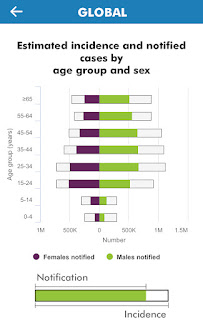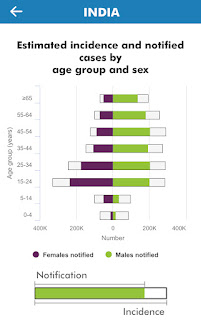One in four persons globally who had developed active TB disease in 2021 was over 55 years of age as per the latest WHO Global TB Report (around 2.7 million people). But over a million of these older people were missed by TB services (or not notified to the national TB programmes if they ever received any kind of care or not).
In India, one in five people who was estimated to have active TB disease in 2021 was over 55 years of age as per the WHO Global TB Report 2022 (over 619,000 people). One third of these older persons could not get access to TB services (or were not notified to the government-run National TB Elimination Programme).
“The population of the elderly persons in India has increased exponentially from 77 million at the beginning of the last century to around 100 million now, forming 9% of the total population of the country. At the same time the number of elderly persons suffering from TB has also remained alarmingly high,” said Dr VK Arora.
TB rate in those above 55 years of age is almost double than others
“The prevalence of TB is 16% among the elderly in India. In fact, the TB rate in those above 55 years of age is 588 per 100,000 population, as compared to the national average of 316 per 100000 population of all ages. There is also a large number of elderly TB patients who remain undiagnosed. Such a high rate of TB necessitates concentrated efforts to control the condition effectively. Increased life expectancy, changes in the demographic profile and atypical presentation of the clinical features of TB pose many challenges in the management of TB in the elderly,” said Dr VK Arora.
TB diagnostic challenges among the elderly
“Elderly persons with TB form a vulnerable group showing high mortality. The diagnosis poses difficulties as they exhibit many atypical features, and symptoms are often similar to other age-related diseases. Many elderly patients present with nonspecific symptoms and the condition is missed for a long period of time, causing delay in correct diagnosis,” said Dr Surya Kant, Professor in Department of Respiratory Medicine, King George’s Medical University, who was also the Scientific Chair of 77th National Conference of Tuberculosis and Chest Diseases (NATCON) held in Agra, India.
TB treatment challenges among the elderly
The treatment of elderly patients with TB is similar to that given to younger patients. However, adverse reactions, such as hepatotoxicity, are more common in the elderly. “Drug interactions are more frequent in them. It has been seen that 63% of the elderly patients exhibit poor tolerance to anti-TB drugs, as compared to 54% in younger patients,” added Dr VK Arora, who is among the Guest Editors of a special issue of Indian Journal of Tuberculosis which is dedicated on the theme of TB and the elderly.
Financial issues often become a hindrance in continuing treatment. Many are not able to take care of themselves. This results in poor adherence to treatment and failure to complete the prescribed course. Loss to follow-up is also quite high. So the response to treatment is also less and there is an increased rate of treatment failure with advancing age.
“The susceptibility of elderly to TB is increased due to the presence of co-morbid conditions, such as type-2 diabetes mellitus, hypertension, cardiovascular diseases, chronic kidney diseases, chronic obstructive pulmonary disease, and malignancy. A strong connection has been established between diabetes and TB among the elderly,” said Dr Arora.
“Moreover, immunity declines with old age. As immunity wanes, many cases appear to have links to the reactivation of lesions that had remained dormant over many years. The susceptibility to the disease is also increased in the background of malnutrition, chronic alcoholism, pollution, unhygienic living conditions and smoking. Also, drug-resistant TB strains put great hurdles to achieve successful treatment outcomes,” he added.
Pneumonia, invasive pneumococcal disease and other lung diseases
Community acquired pneumonia in winters and invasive pneumococcal disease in un-immunised people pose a challenge. Opportunistic bacterial, fungal, viral, and parasitic infections in the elderly are not only difficult to diagnose but also difficult to treat. Further, there are many potential interactions between anti-TB drugs and other additional medications used by the elderly for the management of co-existing diseases.
According to a study, an all-inclusive management that includes geriatricians and infectious disease specialists, is required in these vulnerable patients, said Dr Arora. Health systems equipped with integrated services will have to address the challenge of an ageing population. Early screening and initiation of treatment along with nutritional management are essential to tackle TB in the elderly. Partnerships between organizations are essential for better management of cases.
Dr VK Arora said that “India is progressing towards delivering on the promise to end TB in the next 45 months (by 2025). It is evident that every person with TB needs to be reached with a full spectrum of TB services, including TB prevention, diagnostics, treatment, care and support. We cannot leave behind the elderly – or other TB vulnerable groups.”
Giving due importance to TB prevention, active case finding and adhering to treatment among the elderly will go a long way to exert positive influence for proper management of TB in the elderly to #endTB.
(Citizen News Service)
9 March 2023
(Shobha Shukla is the award-winning founding Managing Editor and Executive Director of CNS (Citizen News Service) and is a feminist, health and development justice advocate. She is a former senior Physics faculty of prestigious Loreto Convent College and current Coordinator of Asia Pacific Regional Media Alliance for Health and Development (APCAT Media). Follow her on Twitter @shobha1shukla or read her writings here www.bit.ly/ShobhaShukla)
 |
| Daily Good Morning Kashmir, India (op-ed page, 10 March 2023) |
 |
|
 |
| The Sangai Express, India (concluding part, published on op-ed page, 18 March 2023) |
- CNS
- Daily Good Morning Kashmir, India (op-ed page, 10 March 2023)
- The Sangai Express, India (part-1 published on op-ed page, 17 March 2023)
- The Sangai Express, India (concluding part, published on op-ed page, 18 March 2023)
- Weekly Blitz, Bangladesh
- The Maravi Post, Malawi
- Modern Ghana
- World News (WN)
- Scoop Independent News, New Zealand
- Pakistan Christian Post
- e-Pao News Network, Manipur, India
- Mandarin News (Mandarin language)



